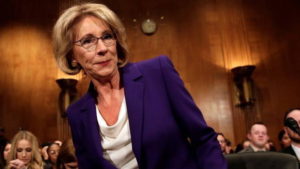Post Highlights
- SB 76 seeks to create fee caps and require reciprocity with other states.
- Of greatest concern for KNEA is blanket reciprocity with other states where requirements and standards for obtaining a teaching license are far lower than in Kansas.
- KNEA believes that the agency best equipped for ensuring licensing requirements is the State Board of Education.
- HB 2148 seeks to centralize procurement through the State Department of Administration.
- Bi-Partisan support growing for bill (HB 2179) to restore due process rights for teachers.
CALL SENATORS MORAN AND ROBERTS AND ENCOURAGE THEM TO STAND WITH KANSAS PUBLIC SCHOOLS.
1-855-882-6229
Senate Committee Considers Changes to All State Licenses
The Senate Federal and State Affairs Committee today held a hearing on Senate Bill 76 which would cap fees collected for all occupational licenses, waive those fees for certain people, and require automatic reciprocity of licenses with other states and units of government.
Supporters of the bill generally expressed their support for the provisions waiving licensure fees for low-income and military persons without addressing the other aspects of the bill.
KNEA joined a long list of opponents including the State Board of Education, the College of Education at Emporia State University, USA/Kansas, the Kansas School Superintendents Association, the Board of Healing Arts, The Pharmacy Board, and the Board of Cosmetology.
All the opponents expressed concern about the fee caps and fee waivers. Fee waivers had some support but only if there was funding provided by the state to ensure that licensing agencies can efficiently do the work necessary to make sure candidates qualify for licensure. Fee caps were opposed often because in some professions higher fees are used to fund continuing education programs.
Of greatest concern was the requirement that licensing agencies would have to accept a license from another state or municipality without regard to the actual standards applied by the other state. In education, state standards for a teaching license vary widely around the country. Kansas has held license applicants to very high standards and would not be well-served if forced to license anyone who held a license regardless of where that license was issued.
Further, this legislation usurps the authority of the State Board of Education to manage the licensure of the education profession.
Committee member Sen. Rob Olson (R-Olathe) suggested that the bill be sent to a subcommittee so that it could be more thoroughly examined. Chairman Jacob LaTurner seemed to agree and announced that the committee would not rush this issue and instead take their time for fully examine all the ramifications.
Hearing on Procurement Consolidation
The House K-12 Education Budget Committee held a hearing today on HB 2148, a bill that would require all school districts to handle procurement of goods through a centralized service in the State Department of Administration. Generally, the Department looks at what items are to be purchased and then negotiates agreements with vendors to provide those items.
The Alvarez and Marsal Efficiency study suggested that this had the potential to save money on school expenditures, however, the study also suggested that a number of changes would need to be made in the Department to handle the additional work that would come from such consolidation.
There are other considerations to take into account. For example, local school districts seek to be good partners with the local community and often buy locally. Local businesses will often try to beat the price available through the state system. Central procurement could have the unintended consequence of harming local businesses.
Bipartisan Bill to Restore Teacher Due Process!
House Bill 2179 is not a committee bill. It is a sponsored bill meaning legislators sign on as co-sponsors and their names are listed on the bill.
House Bill 2179, which would restore the teacher due process law that was repealed at 4:00 am without ever having a hearing in 2014, has been introduced and co-sponsored by 45 Representatives: Crum, Stogsdill, Alcala, Arnberger, Ballard, Bishop, Burroughs, Carlin, Carmichael, Curtis, Deere, Elliott, Ellis, Finney, Frownfelter, Gartner, Good, Henderson, Highberger, Hodge, Holscher, Kessinger, Koesten, Kuether, Lusk, Lusker, Murnan, Neighbor, Ohaebosim, Ousley, Parker, Phelps, Pittman, Ruiz, Sawyer, A. Smith, Tarwater, Terrell, Trimmer, Victors, Ward, Weigel, Whipple, Winn and Wolfe Moore.
Is your Representative on the list of co-sponsors? If yes, please take the time to send a message of thanks.
Now we wait for a hearing in the House Education Committee.
DeVos Nomination on the Razor’s Edge: Where’s Jerry Moran?
While Donald Trump’s nominee for Secretary of Education has been moved out of committee on a 12-11 vote, she is now subject to a vote of the full Senate for confirmation. Two Republican Senators, Susan Collins of Maine and Lisa Murkowski of Alaska, have announced that they will not support the DeVos nomination. Along with 48 Democrats, that puts the numbers at 50-50; breaking ties goes to the Vice President, Mike Pence.
That means we need more Republicans to put schools ahead of Trump’s agenda. We wonder where Jerry Moran will be when that vote takes place.
And that’s your job right now! Jerry Moran needs to know that DeVos is bad for Kansas schools. Call Moran’s office and tell him to put Kansas ahead of partisanship and vote NO on Betsy DeVos. Let Jerry Moran know that Betsy DeVos is bad for rural communities and wrong for special education!



